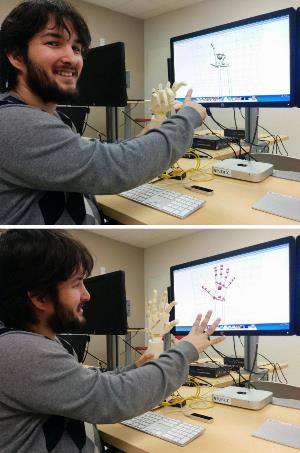Integration of inMoov, Arduino, and Leap Motion
The New Brunswick Community College – Centre for Applied Research in Mobile & Ubiquitous Computing
This student project was an integration of inMoov, "the first life size humanoid robot [that one] can 3D print and animate"; and a Leap Motion controller, a device capable of sensing hand position. This integration was performed used the Arduino open-source electronic prototyping platform.
Research topics
gesture input, usability, user interaction devices
Project Description
This student project was an integration of inMoov, "the first life size humanoid robot [that one] can 3D print and animate"; and a Leap Motion controller, a device capable of sensing hand position. This integration was performed used the Arduino open-source electronic prototyping platform. This project took place January - May 2015.
Part of the system was produced using the 3D printing facilities of Mechanical Engineering, and assembled in the Information Technology – Programmer Analyst (Co-op) program.
Part of the software development and testing process was supported in the NBCC Mobile Ideaspace in Saint John.
Project Outcomes
Ítalo Arruda demonstrates his inMoov / Arduino / Leap Motion project in the Mobile Ideaspace at NBCC Saint John. A video of a similar project can be viewed here: https://www.youtube.com/watch?v=GOTRXM4O9L0
Produced using the 3D printing facilities of Mechanical Engineering, and assembled by students in the Information Technology – Programmer Analyst (Co-op) program, this project is an example of the types of interdisciplinary opportunities available to college students today.
Ítalo, a Brazilian student participating in the Science Without Borders scholarship program, uses his software development skills to print life to circuitry, plastic, and motors.
Mechatronics as we know it today is still in its infancy. A convergence of mechanical, electronic, and software skills combined with the emergence of affordable 3D printing technology has resulted in a “maker movement” across the planet, with information sharing powered by the internet. Just as the personal computer hobbyists of the 1970s changed the world, the “maker” hobbyists of today will impact the economies of tomorrow. For a fascinating preview of this, view the entertaining CBC Doc Zone episode “Roboticize Me”
As they have always done with new trends in technology, colleges are taking the necessary steps to support this new field. In the decades to come, there is no doubt that curriculums will evolve in yet unknown ways. Just as a visitor from the 1970s would be astounded at the level of computer expertise embedded in so many disciplines today, imagine the possibilities of what will be done in Mechatronics in the next 40 years.
Staff and students are encouraged to seek out opportunities to be pioneers in this field.
For more on the Open Source inMoov project, visit http://www.inmoov.fr/
NBCC Team
- Ítalo Aruda, NBCC student
- Joe Marriott, Faculty advisor & Instructor of Information Technology, NBCC Saint John
Funders
- Science without Borders, Government of Brazil
- New Brunswick Community College
- National Sciences and Engineering Research Council - Industrial Research Chair for Colleges
Contact
William McIver Jr., Ph.D.
NSERC Industrial Research Chair in Mobile & Ubiquitous Computing
Centre for Applied Research in Mobile & Ubiquitous Computing
New Brunswick Community College
Centre for Applied Research in Mobile & Ubiquitous Computing URL: http://wiki.nbcc.mobi
E-mail: bill.mciver@nbcc.ca
Twitter: @mciverNBCC
Blog: http://mciver.mobi/
New Brunswick Community College URL: http://nbcc.ca
Media inquiries
![]() | © Copyright 2017 - 2022. All Rights Reserved.
| © Copyright 2017 - 2022. All Rights Reserved.
The New Brunswick Community College – Centre for Applied Research in Mobile & Ubiquitous Computing is supported by
the Natural Sciences and Engineering Research Council of Canada. ![]()
